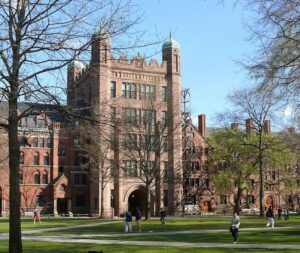
by James A. Bacon
I have long observed that nonprofit colleges and universities, by virtue of being nonprofit, behave very differently than for-profit enterprises. Having weak systems for accountability, higher-ed institutions are captured by their internal constituencies whose interests they place of those of students and their families. Instead of endeavoring to maximize profits, as profit-seeking enterprises do, university leaders seek to maximize prestige compared to other institutions. The result is an endless “arms race” treadmill that misallocates billions of dollars across the industry.
Now comes some empirical support for my hypothesis from Peter Q. Blair and Kent Smetters, with Harvard University and the University of Pennsylvania respectively, in a paper entitled, “Why don’t elite colleges expand supply?”
In a word, universities don’t expand supply because it increases institutional prestige to not do so.
The authors launch their argument with the observation that Yale in 1979 reported 1,346 college freshmen. In 2016, the size of the entering class stood at 1,360 — an increase of 14 students. By comparison, the number of applications to Yale increased by more than 300% — from 9,331 students to 30,932. The pattern for other elite colleges is the same.
“Elite colleges … are serving a smaller and smaller share of total college-bound students, becoming more exclusive all the time,” the authors write. “Elite colleges are now often distinguished by their rising SAT scores and falling admission rates.”
A falling ratio of applications to acceptances indicates greater “selectivity.” So do rising SAT scores. As those metrics burnish institutional prestige, I would add (the authors do not explore this), allows universities to hire more prestigious faculty members. Likewise, when hiring presidents, provosts, deans and other senior officers, university leaders show strong preferences for candidates from more prestigious institutions, who bring their elitist priorities with them.
Prestige considerations induce universities to follow the contradictory aims of adding expensive amenities that pump up the cost of attendance while simultaneously trying to recruit from “non-traditional” demographic groups, typically minorities, that typically find the cost unaffordable.
These same phenomena apply to public universities, including those in Virginia, although the numbers may not be as stark because public universities do face pressure from politicians and the public to expand enrollment and prioritize in-state students. But no sane person would deny that the University of Virginia, the College of William & Mary, and Virginia Tech do not endeavor to maximize their prestige within those limitations.
How does this affect the ongoing debate about the role of higher education today? When colleges and universities are prestige maximizers, they take their cues from the most prestigious institutions. If the Ivy League universities and quasi Ivies like Stanford and Duke are increasingly “woke” in their recruiting, hiring, and campus cultures, institutions below them on prestige ladder eagerly embrace the same practices.
The problem arises from the fact that the Ivies and other private institutions, by virtue of being private, are free to pursue their own visions without accountability to anyone but themselves. But Virginia’s public universities are — or should be — accountable to taxpayers and the public. And taxpayers and the public may have different priorities than maximizing institutional prestige, especially if that prestige is maximized by nurturing campus cultures that are antithetical to the middle-class families who pay an ever-escalating cost of attendance.
Bacon’s bottom line: The institutional imperative to maximize prestige puts university administrators at odds with the public they serve. The rift is widening seemingly by the day.

Leave a Reply
You must be logged in to post a comment.